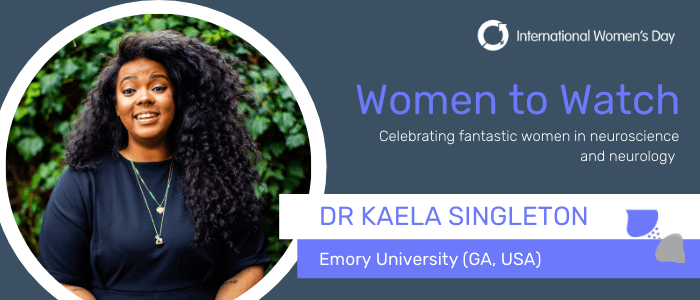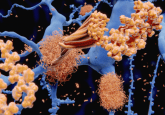Women to Watch: investigating the role of mitochondria retention in Menkes disease with Dr Kaela Singleton

As part of our ‘Women to Watch’ series on Neuro Central, we’re putting Dr Kaela Singleton into the spotlight. Dr Singleton is a Black, multiracial, queer developmental neuroscientist born in Texas (USA) and raised in Georgia (USA). She is currently a postdoctoral fellow in the Faundez Lab at Emory University (GA, USA) and an adjunct professor at Agnes Scott College (GA, USA). Dr Singleton earned her PhD in neuroscience in May 2020 from Georgetown University (DC, USA) and started her postdoc in July of that same year.
In the Faundez lab, her project focuses on understanding how the developing brain becomes susceptible to and protects itself from copper. As an adjunct professor at Agnes, she has taught diseases of the nervous system, labs for foundations in neuroscience and introductory biology. Dr Singleton is also Co-Founder and President-Elect of Black In Neuro, an international organization that aims to uplift and support Black scholars in neuro-related fields by building community.
Can you provide us with an overview of your research?
My postdoc research addresses the role of mitochondrial retention seen in Menkes disease, a progressive form of childhood neurodegeneration that is triggered by dysregulation of copper. Importantly, Menkes disease shares pathogenic mechanisms with neurodevelopmental and neurodegenerative disorders. I am testing the hypothesis that deficits in ATP7A, a chief transporter required for copper homeostasis, activates the pink-parkin mitophagy pathway in order to trap damaged mitochondria within the soma, thus preventing mitochondria delivery to the synapse in patients with Menkes disease. My ultimate research goal is to use systems biology and genetic approaches combined with my training in cellular and molecular neuroscience to investigate the mechanisms that control neuron development in normal and pathological conditions.
What inspired you to become a developmental neuroscientist?
I knew I wanted to study the brain in the 7th grade after a science outreach class where we got to dissect a sheep’s brain. I didn’t realize I wanted to be a developmental neuroscientist until college – I attended Agnes Scott College because they had a comprehensive and complete neuroscience major at the time. After my second year, I earned the Enhancing Neuroscience Diversity through Undergraduate Research Education Experiences (ENDURE) fellowshipand worked at various universities in the southeast, but I really enjoyed and thrived when thinking about what shapes neurons and the diversity seen within the brain. What separates a cortical neuron from a thalamic neuron? How are individual cells shaped and what makes them all different? Those kinds of ‘philosophical’ questions I think lend themselves to developmental neuro, and I decided around then that I wanted to study neural development.
What are the best aspects of your job? What are the most challenging parts?
The best aspect of my job by far is the students. Listening to them, teaching them (inside and outside of the lab) and helping them figure out what they like and don’t like about science/the brain. It’s incredibly rewarding.
The most challenging thing about my job is balancing the fiftyleven things I have going on all the time. From experiments, grading, teaching, meeting with students, mentoring, service – plus my non-academic life. I’d be nothing without black coffee and Google calendar.
Have you ever in your career felt to date that you were at a disadvantage owing to your gender?
Definitely! I’ve felt the most disadvantaged, however, owning my whole identity. As a Black queer woman who happens to be a developmental neuroscientist, finding communities that appreciate my whole self is always difficult. My full identity is additive to my perspective on/in science. It shapes the way I teach my classes, how I approach students and how I handle my responsibilities as an educator, mentor and researcher. I’ve been talked down to and called problematic for making “every conversation about race, gender and/or sexuality,” several times, but to me the best way to make an inclusive equitable environment is to have these sorts of discussions and begin holding institutions and individuals accountable for their compliancy and compliance in structural and systemic barriers that prevent folks from succeeding.
In your opinion, what more could be done to promote gender equality in your field?
Promoting gender equality/equity within a white heteronormative patriarchal institution like academia isn’t possible unless we place Black, Trans and Indigenous women in power. So, for me, that is the solution. Place Black, Trans, and Indigenous women in positions of power and then give them power to make change and support them in making those changes. That support includes fiscal and emotional support. In the most practical sense, this includes comprehensive and better healthcare and benefits, affordable childcare, maternity leave (and leave for adopting children too!), access to mental health resources, and real accommodations for chronic illness and disabilities.
On a research level, this means funding women in their research efforts and creating programs that aide in their professional development. Truly to promote gender equality means to promote equity and put your money where your mouth is in terms of acknowledging, addressing and rectifying systemic and structural issues. Importantly, addressing the intersectionality of these issues is essential. Gender inequity affects not just “women” – which often times means white women – but Black, Latina, Trans, Queer, Indigenous women as well as non-binary folks. To truly promote gender equity means paying the most minoritized women for their labor on and off the tenure clock and creating environments where they are not just seen and heard – but cherished and uplifted. These things really rely on a level of accountability that isn’t fully seen in academia.
What advice would you give to young women hoping to pursue a career in your field?
I’d tell them to have faith in themselves. Surround yourself with folks that uplift, advocate and support you. Build a community of friends inside and outside of academia that ground you and keep you sane. I’d also encourage them to stop apologizing for simply existing and asking for what you have earned and rightfully deserve.
Lastly, do you have any role models who are women that have inspired you?
Yes! I have many – Drs Michelle Jones-London, Marguerite Matthews and Bianca Jones-Marlin. My old mentors, Drs Jennifer Larimore and Gretchen Neigh as well as my nana. Each one of them gives me a sense of hope and confidence – but also hold me accountable to my dreams, goals and passion.
Acknowledgements
This interview was put together and conducted by our Senior Editor, Sharon Salt, with written responses provided to us by Dr Kaela Singleton.
Disclaimer
The opinions expressed in this interview are those of the interviewee and do not necessarily reflect the views of Neuro Central or Future Science Group.
You might also like:





